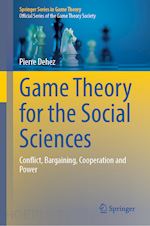
Questo prodotto usufruisce delle SPEDIZIONI GRATIS
selezionando l'opzione Corriere Veloce in fase di ordine.
Pagabile anche con Carta della cultura giovani e del merito, 18App Bonus Cultura e Carta del Docente
This textbook introduces fundamental concepts of game theory and demonstrates its uses and application in the social sciences. Written in plain English and without overwhelming mathematical jargon, it serves as an invaluable resource for undergraduate students in economics, law, political sciences, and related social sciences. Starting from non-cooperative games and progressing to cooperative games, it explores a wide range of topics, including the analysis of zero-sum games, voting rules and their practical implications, and other applications of game theory. Uniquely, it emphasizes cooperative concepts and their normative applications, providing a fresh perspective.
With "Game Theory for the Social Sciences", readers will be equipped with the analytical tools to analyze conflict resolution, bargaining strategies, cooperative decision-making, and the dynamics of power relationships. Through engaging examples drawn from real-world scenarios, readers will develop a solid understanding of how game theory can be applied to diverse fields in social sciences.
“Pierre Dehez offers a consistent kit of classic game theoretic tools, from equilibrium concepts to bargaining solutions and power indices, all illustrated with insightful examples and applications.”
Françoise Forges, Professor of Economics, Université Paris Dauphine-PSL
“This book is written clearly and pedagogically without resorting to difficult mathematics. It provides many different and interesting examples from problems of fair sharing, bargaining to voting systems and many others. It is a perfect introduction to this subject too often quoted but too often misunderstood.”
Alan Kirman, Directeur d’études, Ecole des Hautes Etudes en Sciences Sociales, Paris, and Emeritus Professor, Aix-Marseille University
Chapter 1. Introduction.- Chapter 2. Strategy and conflict.- Chapter 3. Bargaining and consensus.- Chapter 4. Cooperation and fair division.- Chapter 5. Voting and power.
Pierre Dehez is a professor emeritus at the University of Louvain, Louvain-la-Neuve, Belgium. He was previously a professor at the European University Institute in Florence (1983-1989) and at Erasmus University in Rotterdam (1991-1992). He has held visiting positions at the University of Illinois and at various European universities, including Bonn, Strasbourg, Cergy-Pontoise, and Nancy. He is presently an external professor at the University of Pisa, Italy. His research areas cover general equilibrium and game theory.











Il sito utilizza cookie ed altri strumenti di tracciamento che raccolgono informazioni dal dispositivo dell’utente. Oltre ai cookie tecnici ed analitici aggregati, strettamente necessari per il funzionamento di questo sito web, previo consenso dell’utente possono essere installati cookie di profilazione e marketing e cookie dei social media. Cliccando su “Accetto tutti i cookie” saranno attivate tutte le categorie di cookie. Per accettare solo deterninate categorie di cookie, cliccare invece su “Impostazioni cookie”. Chiudendo il banner o continuando a navigare saranno installati solo cookie tecnici. Per maggiori dettagli, consultare la Cookie Policy.